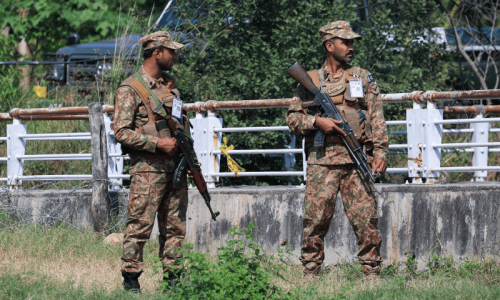The federal government invoked Article 245 of the Constitution and summoned the army for security duties from October 5 to 17 during the two-day Shanghai Cooperation Organization summit.
Any high court cannot issue orders “in relation to any area in which the Armed Forces [are deployed],” as stated in Section 3 of Article 245.
The ensuing statement of this Article says: ” When the armed forces begin to act in support of civil power, any proceeding pending in any High Court pertaining to an area listed in clause (3) will remain suspended for the duration of their involvement.
The court is prohibited by Article 245 from ruling on areas where forces are stationed. However, it did rule on several petitions involving issues in Islamabad, where the army was stationed.
Local businesses filed one of the petitions following violent clashes between police and PTI workers trying to reach D-Chowk for a protest earlier this month.
The merchants looked for mandates for applicable specialists to reestablish the rule of law during PTI’s dissent at D-Chowk.
During the SCO summit, the high court directed the police and district administration to restore order.
The Khyber Pakhtunkhwa government filed a second petition against the Capital Development Authority, which had sealed KP House for allegedly breaking building regulations.
In another petition, the IHC directed the authorities to locate the missing Islamabad-based lawyer for the PTI, Intizar Hussain Panjhuta.
In addition, the IHC chief justice instructed authorities to arrange a meeting between former Prime Minister Imran Khan and his sister Noreen Niazi and to ensure that the detained leader had access to appropriate medical facilities.
No legitimate standing
As per legitimate specialists, IHC’s requests on these petitions when the military was sent in Islamabad had “no lawful impact”.
Mohammad Akram Sheikh, a legal expert, said that Article 199 gives the high court the authority to take on any case “if it is satisfied that no other adequate remedy is provided by law.”
A high court can issue orders on a petition under the aforementioned article “if it is satisfied that no other adequate remedy is provided by law,”
As per Mr Akram, the high court can repeal the procedures started with no legitimate power under Article 199.
In a similar vein, the court has the authority to direct government officials to carry out their responsibilities or rectify an infringement of discretion.



